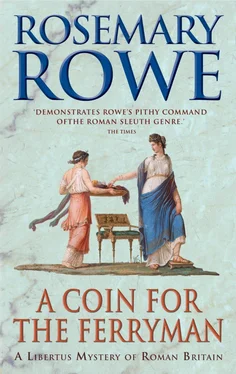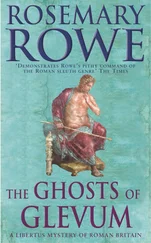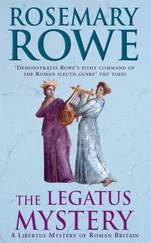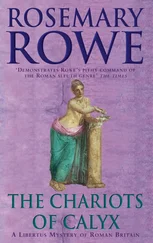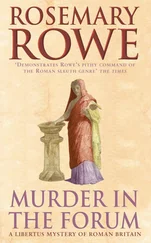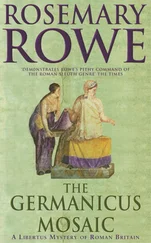Rosemary Rowe - A Coin for the Ferryman
Здесь есть возможность читать онлайн «Rosemary Rowe - A Coin for the Ferryman» весь текст электронной книги совершенно бесплатно (целиком полную версию без сокращений). В некоторых случаях можно слушать аудио, скачать через торрент в формате fb2 и присутствует краткое содержание. Год выпуска: 2013, ISBN: 2013, Издательство: Hachette UK, Жанр: Исторический детектив, на английском языке. Описание произведения, (предисловие) а так же отзывы посетителей доступны на портале библиотеки ЛибКат.
- Название:A Coin for the Ferryman
- Автор:
- Издательство:Hachette UK
- Жанр:
- Год:2013
- ISBN:9781472205131
- Рейтинг книги:3 / 5. Голосов: 1
-
Избранное:Добавить в избранное
- Отзывы:
-
Ваша оценка:
- 60
- 1
- 2
- 3
- 4
- 5
A Coin for the Ferryman: краткое содержание, описание и аннотация
Предлагаем к чтению аннотацию, описание, краткое содержание или предисловие (зависит от того, что написал сам автор книги «A Coin for the Ferryman»). Если вы не нашли необходимую информацию о книге — напишите в комментариях, мы постараемся отыскать её.
A Coin for the Ferryman — читать онлайн бесплатно полную книгу (весь текст) целиком
Ниже представлен текст книги, разбитый по страницам. Система сохранения места последней прочитанной страницы, позволяет с удобством читать онлайн бесплатно книгу «A Coin for the Ferryman», без необходимости каждый раз заново искать на чём Вы остановились. Поставьте закладку, и сможете в любой момент перейти на страницу, на которой закончили чтение.
Интервал:
Закладка:
I pulled them out and held them up one by one in the candlelight. They were all different — provincial, foreign or tribal coins perhaps — and though they were all quite clearly made of gold, only the aureus was a standard Roman coin, and bore the image of a proper emperor. And that — perhaps — was the strangest thing of all, for the head was unmistakably that of ‘Little Boots’, or ‘Caligula’ as the Romans say.
I found myself staring in amazement at the coin. All coinage that bore the head of Little Boots had been officially withdrawn after his assassination and reminted with the face of his successor, Claudius. It was illegal coinage, rare and potentially quite dangerous to own — though still, quite literally, worth its weight in gold. I explained the circumstances to the other two.
Stygius frowned and Junio commented, ‘That’s very peculiar, master, isn’t it? Why bury her in a garment which had a fortune in the hem?’
I shook my head. ‘I don’t understand it. Perhaps the killer didn’t know. There is something very peculiar about this crime. Let’s take the garment off her, Stygius.’
It was no easy matter, but we half sat the body up and gently eased the gown away from it.
‘She cannot have been very old,’ I said. ‘Her chest is as smooth and formless as a child’s. And the mystery isn’t over.’ I had glimpsed the back. ‘Have a look at this!’
There was what looked like a stab wound on the shoulder area, as if a whole lump of flesh had been removed. Yet there was no sign of the copious bleeding which such treatment would be expected to produce: only a tiny runnel of dried blood on either side. Another injury inflicted after death? And if so, to what purpose? I laid the body down.
There was a modesty-binding wrapped around between the legs, and almost without thinking I released the piece of cloth to see if there were more wounds in the lower area.
Junio whistled for a second time, and even Stygius let out a startled cry.
‘Great Ceres! You were right about this being peculiar, citizen!’ What we were looking at was unquestionably male.
Chapter Four
For a moment we all stood quite dumbfounded, and then — as if at some unseen signal — we all three moved at once. I tucked the loincloth back in its proper place, but it seemed indecent to dress this unfortunate young man in some peasant woman’s filthy clothes again, so I simply pulled the shroud-sheet over his half-naked form and covered him from sight, leaving the cast-off garments underneath the bier. Junio, meanwhile, was stuffing the candle back on to its spike while Stygius hurried to the door and flung it wide. None of us uttered a single word throughout: we were all too shaken by the discovery.
It was a relief to come out into the stable court, to fresh air and sunshine and the normal world. The blond pageboy was still waiting patiently for us. He had been perching on the corner of a transport sledge on which a load of chopped wood was piled — destined for the bath-house furnace, probably — and he leapt guiltily to his feet when we appeared.
‘You have seen what you required, citizens?’ he asked, and then — observing that Stygius had accompanied us — ‘My orders were to show you two gentlemen into the atrium again, and fetch you some refreshment. The mistress is anxious to hear what you report.’ He was looking with disdain at our companion as he spoke. There is almost as wide a gulf between a pampered page and a grubby land-worker as there is between a master and his favourite household slave.
Stygius shuffled and would have gone back to his post, but I intervened. ‘I will take responsibility for Stygius,’ I said. ‘There are some developments I think your mistress ought to know.’
The pageboy gave me a disarming smile. ‘Then you have solved the mystery? Some of the servants were taking bets on it. They say the master always calls on you when there is a problem that he needs to solve.’
‘Then I hope they have not staked more than an as or two,’ I said. ‘I’ve not solved anything. The mystery, if anything, is grimmer than before.’ I stood back and gestured that he should go ahead, so that — although he was brimming with curiosity — there was nothing he could do but lead us in. We followed him, into the inner courtyard garden and round the colonnaded path which links the individual bedrooms and storerooms to the central block. When we came to the door that gave into the atrium from the rear, he opened it, stood back to let us in, and then disappeared in the direction of the kitchen block — to fetch the promised refreshments, I assumed.
I led the way into the atrium to wait. As soon as I crossed the threshold, however, I stopped, embarrassed. The room was not empty after all.
Julia was kneeling at the lararium , the shrine dedicated to the household gods, which was set into a niche on one side of the room. She was not making an offering, of course — since she is a woman, it is not her place — but she had pulled her mantle up across her head and seemed to be talking to the statues of the gods, watched by two maidservants who stood by on either side. They looked at one another when they saw us coming in, and if they had been close enough to nudge each other, I’m sure they would have done.
I was surprised and a little astonished to find Julia doing this. Of course there were several altars in the house and grounds, each consecrated to a different god, and necessary rituals were dutifully observed — especially when people were visiting the house. Marcus, like many other Romans of his rank, would not dream of lying down to dine without making a libation to the goddess of the hearth, and the leftovers remaining after any feast were always offered to the storehouse guardians — though, as usual, whatever the Lares themselves did not consume was left to be shared between the servants afterwards. (I well remember, when I was a slave myself, being grateful that the household gods had so little appetite.)
Yet these observances were symbolic ones: rituals expected of a wealthy magistrate. As a senior official of imperial Rome, Marcus was required to set a good example in such things — just as he attended public sacrifice and made a show of consulting the auguries on affairs of state. But — again like most of his fellow countrymen — he did not genuinely expect the gods to take an active interest in his day to day affairs. Women are sometimes different, of course — it is known that some pious Roman matrons engage in private prayer, or at least have expensive prayer tablets engraved and nailed up on temple doors — but Julia had never exhibited such idiosyncratic tendencies. She attended household rituals as propriety required and always looked suitably demure, but I don’t believe she generally communed with deities.
Indeed, she seemed embarrassed when she realised we were there. She hesitated for a minute; then — with a final mutter in the direction of the shrine — she rose and smiled at me.
‘Ah, Libertus!’ She had turned faintly pink. She made no mention of my two companions, who were still waiting behind me at the door.
There was an awkward silence. I took a step towards her. ‘Your pardon, Julia. We should have announced our presence, but the slave boy indicated that we should come in. .’
She made a tutting sound. ‘It’s Niveus, that new page of ours. He should have knocked, of course. We only bought him a few days ago: Pulchrus has gone to Londinium, as you know, and Marcus decided — the minute he had gone — that he simply couldn’t manage without someone in the role. This boy came recommended — from a wealthy household, too — but I think they only really kept him as a pet. He does not seem to have the least idea of what to do and when. I said to Marcus when he bought him that the boy was far too young, but of course my husband was enchanted with his looks and wouldn’t be dissuaded. You know what Marcus is.’
Читать дальшеИнтервал:
Закладка:
Похожие книги на «A Coin for the Ferryman»
Представляем Вашему вниманию похожие книги на «A Coin for the Ferryman» списком для выбора. Мы отобрали схожую по названию и смыслу литературу в надежде предоставить читателям больше вариантов отыскать новые, интересные, ещё непрочитанные произведения.
Обсуждение, отзывы о книге «A Coin for the Ferryman» и просто собственные мнения читателей. Оставьте ваши комментарии, напишите, что Вы думаете о произведении, его смысле или главных героях. Укажите что конкретно понравилось, а что нет, и почему Вы так считаете.
